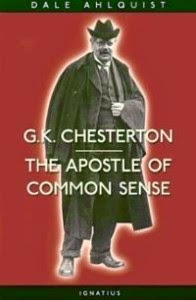His death was front page news around the world and was met with an outpouring of spontaneous groans and genuine grief. Thousands of people who had never met Chesterton but who had welcomed him into their homes through his newspaper columns felt as though they had lost a friend. But the next few decades passed and he was forgotten. Then something quite contrary happened. Thousands of people suddenly found a friend in Chesterton. His books and essays surged back into print, and people got to know him all over again, embracing the sense of wonder and joy that lives on in his words.
We have witnessed a revival, and it has, of course, been personally gratifying as Chesterton has proved to be my friend, my hero, my mentor, my Virgil, who led me, not through the Inferno but through the comedy which is indeed divine. It is a great joke that he led this Baptist to the Catholic Church.
I certainly feel that I know him very well as I have explored the mountain of his words. Five thousand essays and counting. In the last few years we have found over four hundred previously uncollected essays. Yet I often think about the impenetrable wall that exists between those of us who have known Chesterton only through his writings and those who actually knew him in person. As we approach eight decades since his death, that latter list continues to dwindle.
Read the rest here.
This blog cites the many writers G.K. Chesterton influenced: from contemporaries like G.B. Shaw and H.G. Wells (with whom he graciously disagreed) to current authors like Dean Koontz and J.K. Rowling. A sample:
-Agatha Christie was a fan of Chesterton's detective Father Brown:
Father Brown has always been one of my favorite sleuths...He is one of the few figures in detective fiction who can be enjoyed for his own sake, whether you are a detective fan or not. [28]-Dean Koontz is another Chestertonian. In an interview with Gilbert Magazine, he was asked which was the first Chesterton book he had read, stated:
Orthodoxy, and it had a powerful effect. Then I read The Everlasting Man, which I think was the better of the two. Together they were like a one-two punch. [29]Shortly afterwards, when asked how Chesterton's precision of writing had influenced his writing, Koontz responded:
The precision of his language, the clarity of his thought, his exuberant nature, and his delight in tweaking the humorless who are humorless because of their dour materialism- all of those things influenced my writing.[29]Indeed, Chesterton quotes feature as epigraphs in at least four of his novels (Relentless, Breathless, and two volumes of his Frankenstein Series: Lost Souls and The Dead Town). Koontz also dedicated The Dead Town to GKC:
To the memory of Gilbert K. Chesterton, who presented wisdom and hard truths in a most appealing package, changing countless lives with kindness and a smile [30]-Another person on whom Chesterton's influence came was Alfred Hitchcock. According to Hitchcock biographer, Donald Spoto:
The influence of Chesterton must be assessed as well. Much admired and celebrated by the Catholic clergy, and read by Catholic schoolboys, Chesterton's popular essays "A Defence of Penny Dreadfuls" and "A Defence of Detective stories" (published in his 1901 collection The Defendant) entertained the adolescent Hitchcock, and provided him with ideas for the formation of his own style and vision when he was an apprentice filmmaker. It was Chesterton who defended popular literature, Chesterton who pointed out the archetypal, fairy-tale structure of police stories, and Chesterton who defended exploration of criminal behavior.In fact, the title (though not the plot) of one of Hitchcock's movies (and it's remake), The Man Who Knew Too Much, is derived from a book of mysteries by Chesterton's of that name:
'One of the strangest examples of the degree to which ordinary life is undervalued is the example of popular literature, the vast mast of which we contentedly describe as vulgar.' Hitchcock read in 'A Defense of Penny Dreadfuls.' [31]
Hitchcock made The Man Who Knew Too Much twice, in England in 1934 and in America in 1956. It was based on a story by Charles Bennett and D.B. Wyndham-Lewis, though the title actually comes from a collection of mysteries by G.K. Chesterton, to which Hitchcock owned the rights and which has nothing to do with the story-line of the films he made. [32]-Chesterton was "one of [President Theodore] Roosevelt's favorite contemporary writers." [33], and Roosevelt expressed a desire to meet Chesterton during a visit to England. [33a]. Such a desire was fulfilled, and Roosevelt, after meeting Chesterton, had this to say about him.
What a supreme genius Chesterton is! I never met a man who could talk so brilliantly and interestingly. [33b]-J.K. Rowling, a member (at least at one time- I do not know if she is still or not) of the UK Chesterton Society [34], has "paid homage to" Chesterton. [35]
And here's another post, focused on Chesterton's influence on Christians in his own time and ours.
Brandon Vogt has a Chesterton giveaway, including the book pictured above, on his blog. As I mentioned to a facebook friend--"You could enter, but I should win!"

No comments:
Post a Comment